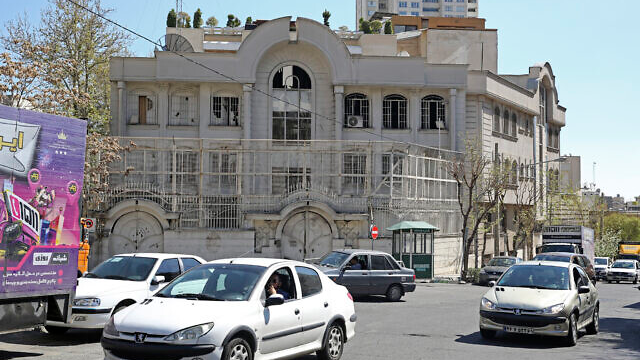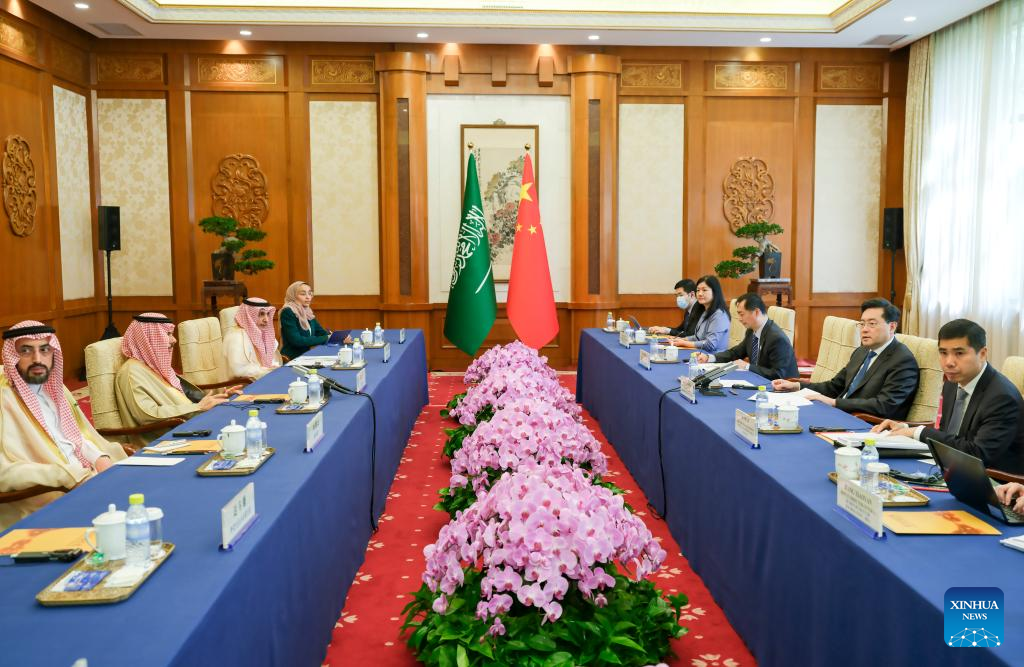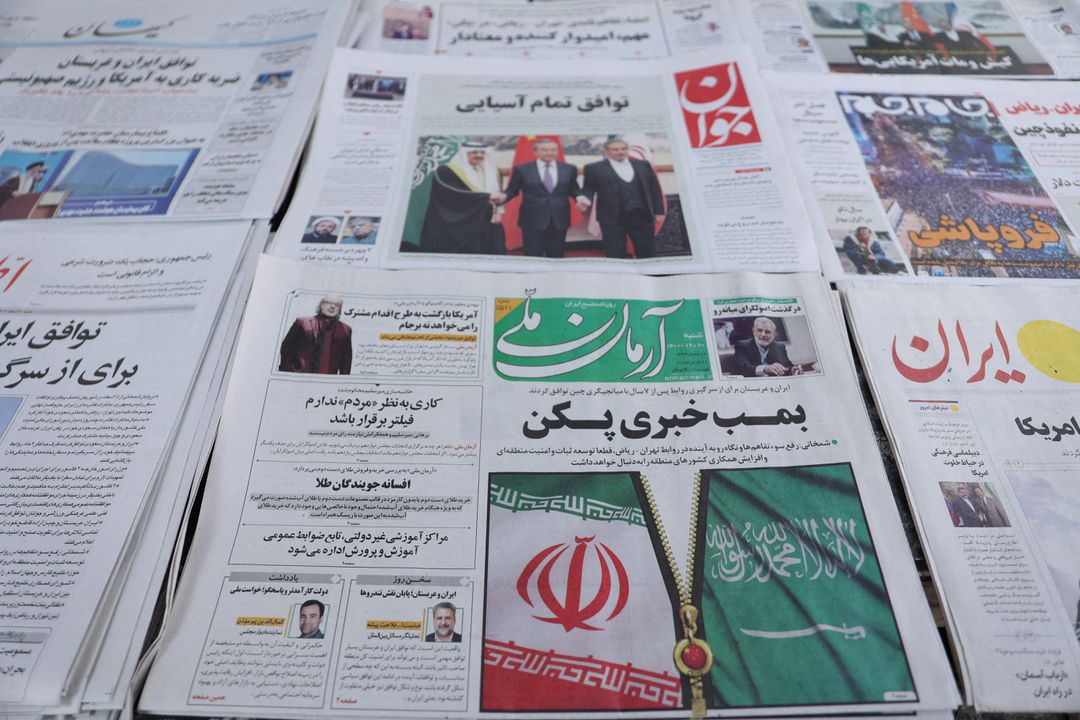
Vehicles drive past the Saudi Arabia embassy in Tehran, Iran, April 5, 2023. /Atta Kenare/AFP
Vehicles drive past the Saudi Arabia embassy in Tehran, Iran, April 5, 2023. /Atta Kenare/AFP
In the past month, the Gulf nations of Saudi Arabia and Iran have been taking steps toward the normalization of bilateral relations, patching up a long-time rift that has shaped geopolitics in the Middle East.
Since the two countries agreed to restore diplomatic ties in March, their foreign ministers have met in Beijing and Iran's technical team has arrived in Riyadh to prepare for the reopening of its embassies in Saudi Arabia.
During the meeting in Beijing last week, the two countries signed a deal brokered by China. The deal entails reopening their respective embassies, resuming flights and granting visas for citizens of the two countries.
Both sides noted that they will continue to put forth efforts in normalizing relations in line with the road map and timeline identified in their Beijing talks in March.
"Beijing has been playing a much more active role, even in the Persian Gulf region," Reza Zabib, assistant minister for the Asia-Pacific of Iranian Foreign Ministry, told CGTN.
Stephane Dujarric, spokesman for the UN secretary-general also expressed his optimism toward the progress, saying that good relations between the two countries are essential for the stability of the Gulf region.
As the largest trading partner for both countries, China has pledged to continue to be a mediator, supporting both sides in building trust and dispelling misgivings, as well as urging the international community to help the Middle Eastern countries resolve their differences, the Chinese Foreign Ministry said.

Chinese State Councilor and Foreign Minister Qin Gang meets with Saudi Arabian Foreign Minister Prince Faisal bin Farhan Al Saud in Beijing, capital of China, April 6, 2023. /Xinhua
Chinese State Councilor and Foreign Minister Qin Gang meets with Saudi Arabian Foreign Minister Prince Faisal bin Farhan Al Saud in Beijing, capital of China, April 6, 2023. /Xinhua
A weakened U.S. role in the region
The reconciliation between Saudi Arabia and Iran presents an alternative vision to the Middle East geopolitical scene.
Relations between the two countries have been fraught for decades. Talks in Beijing marked the first formal meeting of senior diplomats from the two nations since the diplomatic rupture in 2016, when the embassy in Tehran was stormed during a dispute between the two countries over Riyadh's execution of a Shi'ite Muslim cleric.
While the U.S. expressed optimism toward the meeting of Iran and Saudi Arabia, it remained doubtful about how far the reconciliation efforts would improve.
"If this dialogue leads to concrete actions by Iran to curb its destabilizing activities in the region, including the proliferation of dangerous weapons, then of course, we would welcome that," said Vedant Patel, the principal deputy State Department spokesman.
"Renewed Iran-Saudi ties as a result of Chinese mediation is a lose, lose, lose for American interests," said Mark Dubowit, CEO of the Foundation for Defense of Democracies (FDD), a non-partisan institution focusing on national security and foreign policy based in Washington, D.C., on twitter.
The restoring of ties shows that the Saudi "don't trust Washington to have their back," and Iran sees an opportunity to "peal away American allies to end its international isolation," he said.
According to a recent study published in March by the United States Institute of Peace, a nonpartisan and independent institute, countries in the Middle East feel that U.S. security guarantees have been inadequate, and this has been compounded by perceptions that the U.S. is re-evaluating its role in the region.
China successfully performed the task that the U.S. failed to deliver in spite of its prolonged political and economic alliance with Saudi Arabia, according to Jonathan Sullivan, director of China programs at the Asia Research Institute of Nottingham University.
Most of China's policies and practices in the Middle East aim at "maintaining balance" by "establishing and maintaining positive economic and political relationships" with all countries, including Saudi Arabia and Iran, he wrote.

A newspaper with a cover picture of the flag of Iran and Saudi Arabia, is seen in Tehran, Iran, March 11, 2023. Majid Asgaripour/WANA (West Asia News Agency) via Reuters
A newspaper with a cover picture of the flag of Iran and Saudi Arabia, is seen in Tehran, Iran, March 11, 2023. Majid Asgaripour/WANA (West Asia News Agency) via Reuters
A possible realignment in the Middle East
The Iran-Saudi agreement shows signs of an ongoing change in both countries, as well as in the broader Middle East and other global dynamics.
On April 12, Syrian Foreign Minister Faisal Mekdad arrived in Saudi Arabia – the first visit of a Syrian official since the outbreak of the Syrian civil war in 2011. With the growing ties between the two Arab countries, the restoration of their relations becomes increasingly probable.
The move came following the re-establishment of ties between Saudi Arabia and Iran, which is considered to be Syria's closest ally in the region.
Meanwhile, the Gulf nations of Bahrain and Qatar agreed to resume diplomatic ties. Both sides confirmed that the move is a result of shared interests and promoting integration within the Gulf region.
Also this month, Egyptian Foreign Minister Sameh Shoukry visited Ankara, a part of the joint efforts of Türkiye and Egypt to improve their bilateral relations following a decade of political tensions.
The first meeting between the two countries' top diplomats in 11 years took place last month, when Turkish Foreign Minister Mevlut Cavusoglu visited Cairo and held talks with Shoukry.
The recent interactions in the Middle East are occurring amidst a series of regional attempts to settle disagreements indicating desires of peace and development by the people.
The relations between regional heavyweights of Saudi Arabia and Iran going back to normal would bring more opportunities for settlements of regional crisis, said Wang Jin, associate professor from Northwest University of China, noting that it would pave the way for a more stable, peaceful Middle East.